Are your keyword rankings dropping? If so, you’re not alone. Keyword rankings fluctuate by default, and there are many reasons why this might happen. A new or updated Google algorithm, changes in your website’s content or backlinks, or seasonal trends can all affect your rankings.
In this blog post, we’ll discuss the most common reasons keyword rankings fluctuate and what you can do to improve your chances of ranking higher. We’ll also provide some tips on how to recover from a ranking drop.
If you’re in the early stages of SEO or seeking to enhance your current rankings, keep reading for valuable insights.
Here are some facts and statistics about keyword ranking fluctuations:
- Google makes over 500 algorithm changes per year.
- The average keyword ranking can fluctuate by up to 20% per month.
- The most common reason for a ranking drop is a Google algorithm change.
- Other factors affecting rankings include website content changes, backlinks, and competition.
- It can take up to 3 months for rankings to recover from a significant drop.
Understanding Why Google Keyword Rankings Fluctuate
Keyword rankings on search engines like Google are never static; they constantly change, and understanding why can be crucial for your SEO efforts. Several factors contribute to these fluctuations, including:
The Impact of Google Algorithm Updates on Keyword Rankings
Google designs algorithm updates to improve the quality of search results. These updates can cause significant changes in keyword rankings.
Google’s ever-evolving search algorithm is one of the most significant factors contributing to keyword ranking fluctuations. Google frequently updates its algorithm to improve search results and provide users with the most relevant and valuable content. These updates can substantially impact where your website ranks for specific keywords.
How Google algorithm updates change the ranking factors
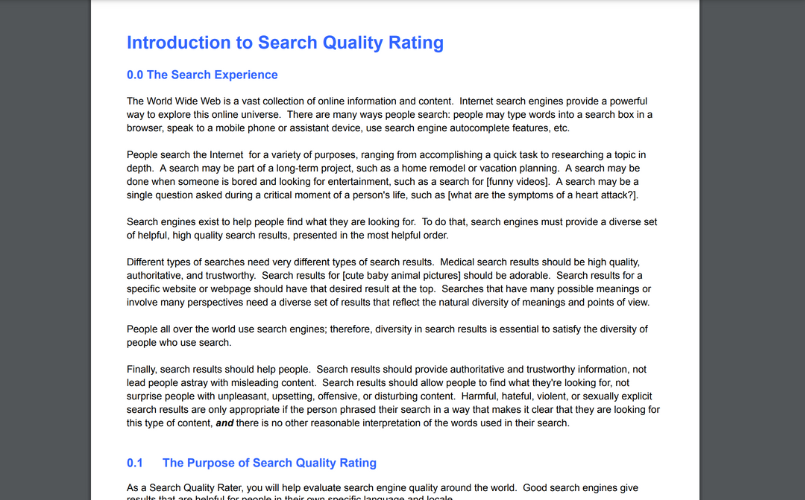
Google’s algorithms consider numerous ranking factors when determining where a webpage should appear in search results. Algorithm updates can alter the importance of these factors. Here’s how they can change the ranking landscape:
-
- The quality and relevance of your website content: Google aims to display the most relevant and informative results for users’ queries. To achieve this, your website’s content must be of high quality and relevance, as it is among the most important ranking factors.
- The number and quality of backlinks to your website: Backlinks are links from other websites to your website. These links are a valuable signal to Google that your website is high-quality.
- The technical SEO of your website: The technical SEO of your website refers to the way that your website is built and structured. If your website has technical problems, such as broken links or slow loading times, this can hurt your keyword rankings.
- The user experience of your website: Google also considers the user experience of your website when ranking it. Your website’s structure, the readability of your content, and the ease of navigation can all affect your keyword rankings.
Keeping track of these changes and adapting your SEO strategy accordingly is essential to maintaining and improving your keyword rankings.
How to stay up-to-date with Google algorithm updates
Staying informed about Google’s algorithm updates is crucial for managing keyword rankings effectively. Here’s how to do it:
-
- Follow Google’s blog: Google publishes blog posts about its algorithm updates.
- Webmaster Guidelines: Review Google’s Webmaster Guidelines to understand best practices and avoid penalties
- Use an SEO tool: Several SEO tools track Google algorithm updates.
- Join an SEO community: There are some SEO communities where you can discuss Google algorithm updates.
Stay up-to-date with Google algorithm updates to prepare for changes affecting your keyword rankings.
How does User Search Influence Keyword Rankings?
When people search for a keyword, they may look for different things at different times. For example, if you search for “how to make a cake,” you might be looking for a recipe, a video tutorial, or a blog post with tips. If Google changes how it interprets search intent for a keyword, it can cause your rankings to fluctuate.
How to understand search intent
- Consider the user’s needs: When trying to understand search intent, it’s crucial to consider what the user is looking for. What are they trying to achieve? What information do they need?
- Use keywords: The keywords that people use in their search queries can give you clues about their search intent. For example, if someone searches for “how to make a cake,” they’re probably looking for a recipe.
- Read the search results: They can also give you clues about search intent. Pay attention to the types of websites that are ranking for the keyword, as well as the content of those websites.
- Use Google Search Console: Google Search Console is a free tool that can help you understand how people are finding your website and what they’re searching for. You can use Search Console to see the keywords people use to find your website and the pages that rank for those keywords.
How to optimize your content for search intent
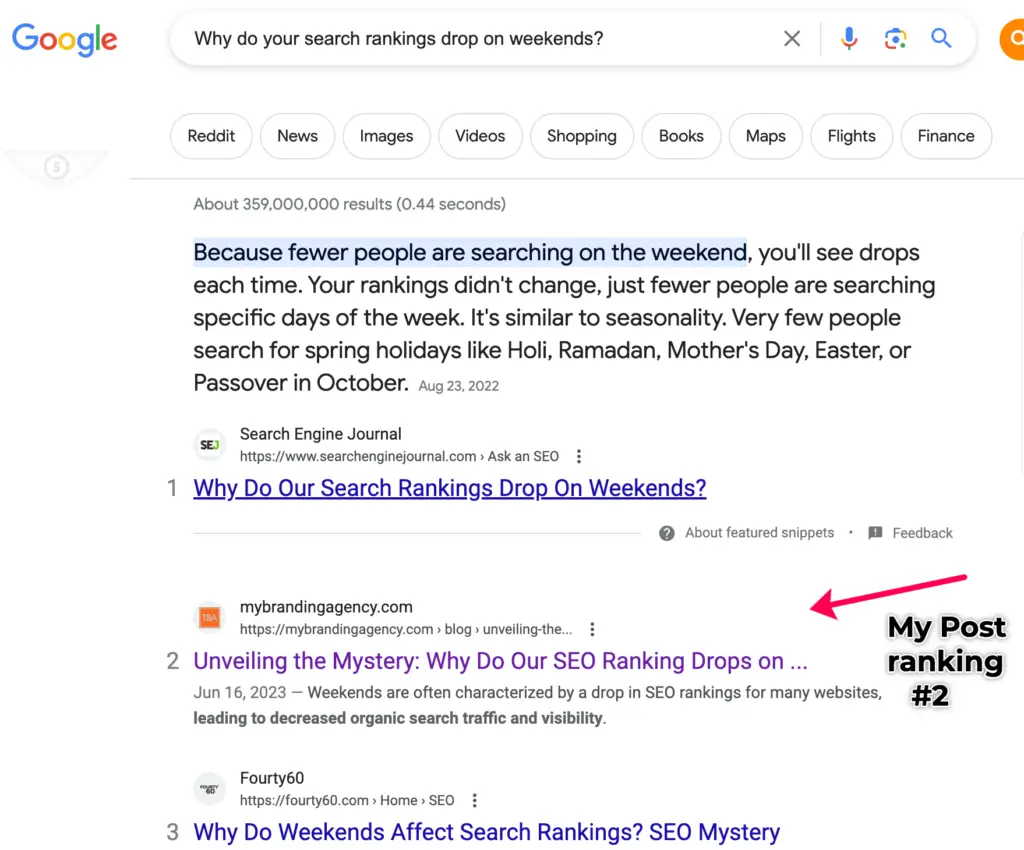
Once you understand the search intent for your targeted keywords, you can optimize your content accordingly. Here are some tips:
- Use the proper format: If the top-ranking pages are blog posts, you should use a blog post format for your content.
- Answer the user’s query: Ensure your content provides the information users seek.
- Use relevant keywords: Include keywords relevant to your content’s search intent.
- Provide high-quality content: Google prioritizes high-quality content that provides value to users.
Remember, SEO is not just about getting high rankings. It’s about attracting the right audience and providing them with valuable content. By understanding and optimizing for search intent, you can improve your SEO strategy and ensure that your rankings don’t drop.
Increased Competition
One of the most common reasons for keyword ranking fluctuations is increased competition. As more and more websites target the exact keywords, it becomes more difficult to rank high.
To compete with other websites for high-ranking keywords, you must create high-quality content relevant to your target audience. You also need to build backlinks to your site from other high-quality websites.
How to compete with other websites for high-ranking keywords
To effectively compete with other websites for high-ranking keywords, it’s crucial to have an effective SEO strategy. This strategy should involve optimizing your content for relevant keywords, improving your site’s quality and user experience, and building high-quality backlinks.
How to track your competitors’ keyword rankings
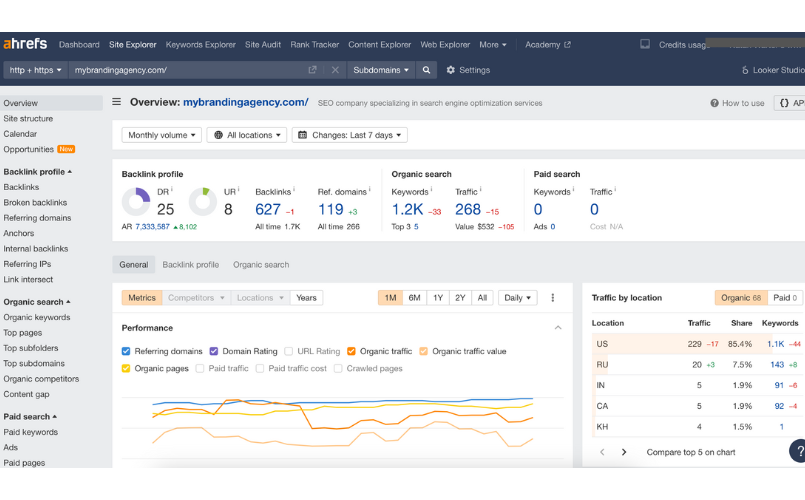
To determine which keywords your competitors are targeting and how well they rank for those keywords, you can use several tools to track their keyword rankings.
Some popular tools for tracking keyword rankings include:
- SEMrush
- Ahrefs
- Moz
- SpyFu
How to Monitor Keyword Ranking Fluctuations for Google Search
Keyword ranking fluctuations are a common occurrence in the world of SEO. Monitoring them is crucial to maintaining and improving your website’s search engine performance. In this comprehensive guide, we’ll explore two primary methods for monitoring keyword ranking fluctuations: using SEO tools and manually checking your rankings.
Using SEO Tools
There are many SEO tools available that can help you monitor your keyword rankings. These tools can provide valuable insights into your website’s performance in search engine results pages (SERPs) for specific keywords.
How to choose the right SEO tools
When choosing an SEO tool, it’s essential to consider the following factors:
- Accuracy: The tool should provide accurate data on your keyword rankings.
- Ease of use: The tool should be user-friendly and easy to navigate.
- Features: The tool should offer a range of features, such as tracking multiple keywords and monitoring changes over time.
- Price: The tool should be affordable and offer good value for money.
How to use SEO tools to monitor keyword rankings
Once you have chosen an SEO tool, you can use it to monitor your keyword rankings by following these steps:
- Add your website: Add your website to the tool to start tracking your keyword rankings.
- Add your keywords: Add the keywords you want to track to the tool.
- Monitor your rankings: The tool will provide regular updates on how your website is performing in SERPs for the keywords you are tracking.
Manually Checking Your Rankings: Navigating Keyword Ranking Fluctuations and Algorithm Updates
While SEO tools provide valuable automated insights, manually checking your keyword rankings in Google Search can better understand your website’s performance. Here’s a step-by-step guide on how to manually check your keyword rankings
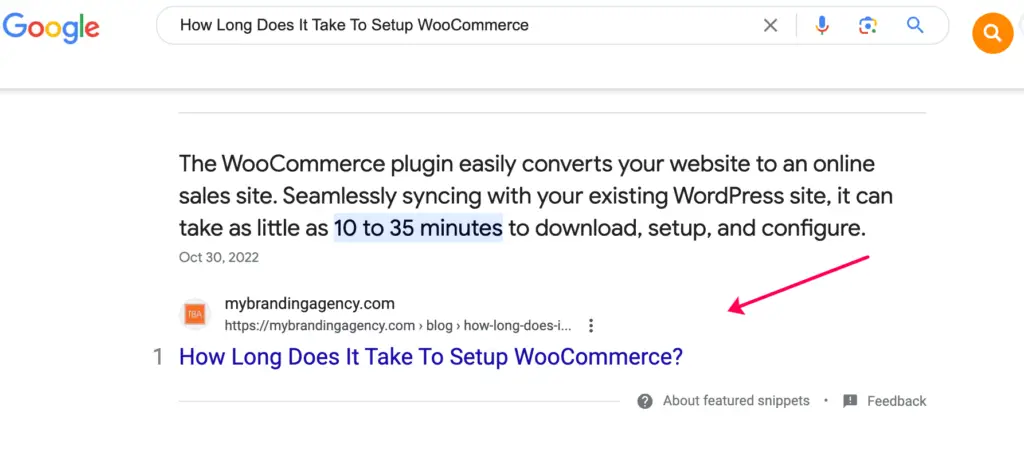
See how I ranked #1 in Google for “How Long Does It Take To Setup WooCommerce” Pulled from a manual Google Search on September 10, 2023
How to manually check your keyword rankings in Google Search
- Open Google Search: Go to Google and enter the keyword that you want to check in the search bar.
- Use Incognito Mode: Use your browser’s incognito or private browsing mode to avoid personalized results.
- Check the results: Look at the search results to see where your website appears. If it appears on the first page of the results, then it is ranking well for that keyword.
How to track your keyword rankings over time
To track your keyword rankings over time, you can follow these steps:
- Create a spreadsheet: Create a spreadsheet to record your keyword rankings over time.
- Record your rankings: Every time you check your keyword rankings, record the date and the position of your website in the search results in the spreadsheet.
- Monitor changes: Over time, you can see how your keyword rankings have changed and identify any trends or patterns.
What to Do When Your Keyword Rankings Drop
Experiencing a drop in keyword rankings can be disheartening, but it’s important to remember that fluctuations are a normal part of SEO. Identify the reason for the ranking drop. It’s essential to identify the root cause of the problem so that you can take the necessary steps to fix it.
Revise Your Content
You’ll need to revise your content if it is no longer relevant to your target keywords or needs to be more high-quality. To do this, consider adding new information, updating the formatting, or improving the overall readability.
How to make sure your content is high-quality and relevant to your target keywords
1. Content Audit: Begin by conducting a comprehensive content audit. Identify pages with declining rankings and assess their quality and relevance to target keywords.
2. Keyword Research: Revisit your keyword research and ensure your chosen keywords remain relevant to your audience and industry. Update your list if necessary.
3. Content Updates: Enhance existing content by adding fresh information, statistics, and examples. Ensure that the content provides value to your audience and addresses their needs.
4. On-Page SEO: Review on-page SEO elements, including meta titles, meta descriptions, headers, and image alt tags. Optimize them with your target keywords.
5. Improve Readability: Consider the readability of your content. Break up long paragraphs, use subheadings, and include bullet points or numbered lists to make it more reader-friendly.
6. Internal Linking: Strengthen your content’s SEO by adding internal links to related pages on your website.
7. External Links: Include authoritative external links to credible sources, enhancing your content’s credibility and SEO value.
8. Mobile Optimization: Ensure your content is mobile-friendly, as Google prioritizes mobile-friendly websites in its rankings.

How to improve the readability and SEO of your content
You can do several things to improve the readability and SEO of your content.
- Use clear and concise language. Avoid using jargon or technical terms that your target audience might not understand.
- Break up your text with headings and subheadings. This will make your content easier to scan and understand.
- Use images and videos to break up the text. This will make your content more visually appealing and engaging.
- Optimize your content for search engines. This includes using relevant keywords throughout your content and adding title tags and meta descriptions.
How to Prevent Keyword Ranking Fluctuations and Maintain Top Google Search Rankings
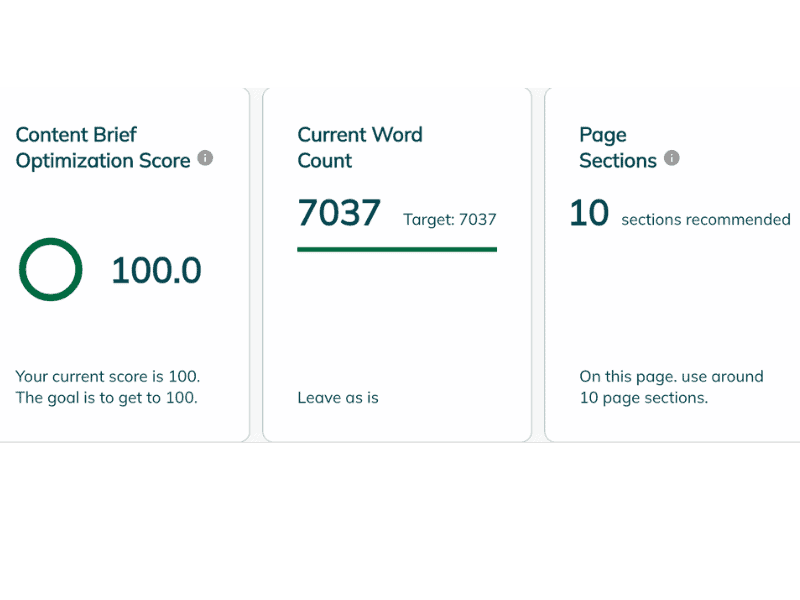
I Use PageOptimizerPro to rate my content and ensure it’s high-quality and SEO-friendly.
Keyword ranking fluctuations are a normal part of SEO. However, you can do a few things to minimize the chances of your rankings dropping. One of the most important things is to create high-quality content.
Create High-Quality Content
- Keyword-rich content: Your content should be relevant to your target keywords. Use relevant keywords throughout your content, including title, meta description, headers, and body.
- Well-written and informative: Your content should be well-written and informative. Your content should be well-written and informative by providing comprehensive and accurate information on the subject and using clear and concise language.
- Original and unique: Your content should be original and unique. It’s vital to avoid plagiarism and generate material that differs from what’s already available online.
- Up-to-date: Your content should be up-to-date. To ensure that your content is up-to-date, updating it with new information as it becomes available periodically is essential.
- Engaging and visually appealing: Your content should be exciting and visually appealing. To make your text more interesting and visually appealing, consider using images, videos, and other media to break up the content.
Create High-Quality Content with PageOptimizer Pro
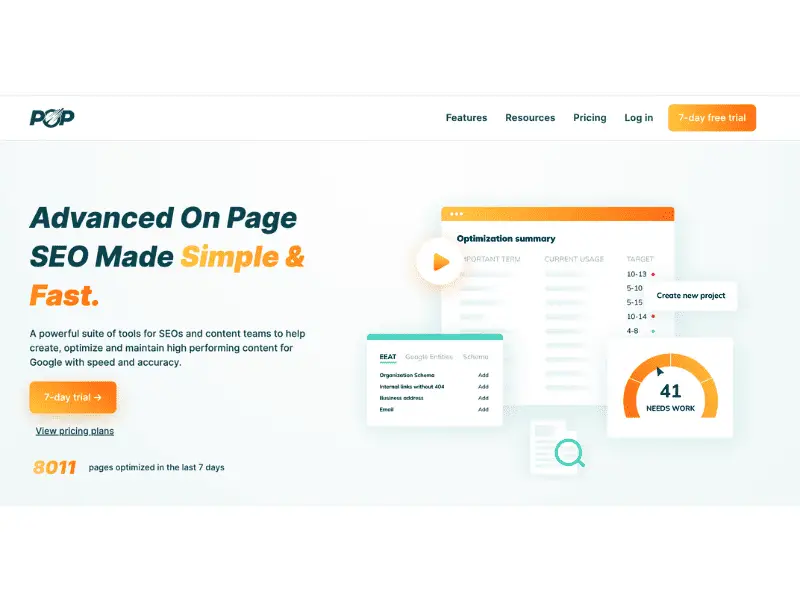
When crafting exceptional content that engages your audience and ranks well on Google, one tool has consistently stood out: PageOptimizer Pro. For over a year, I’ve relied on this powerful suite of tools to help me create, optimize, and maintain high-performing content with remarkable speed and precision.
PageOptimizer Pro https://www.pageoptimizer.pro/ is a game-changer for SEO and content teams. It provides a comprehensive set of tools designed to elevate your content strategy to the next level. Whether you’re a seasoned SEO professional or a content creator looking to improve your content’s Google performance, PageOptimizer Pro has you covered.
Here’s why I trust PageOptimizer Pro for my content optimization needs:
1. Precision Optimization: With PageOptimizer Pro’s cutting-edge analysis and recommendations, you can fine-tune your content for the best possible performance on Google.
2. Speedy Results: Save valuable time in the content optimization process, thanks to the efficiency of PageOptimizer Pro’s tools.
3. **Long-term Maintenance:** Keep your content performing well over time with PageOptimizer Pro’s maintenance features, ensuring your content stays ahead in the ever-changing SEO landscape.
If you’re serious about creating high-quality, SEO-friendly content, I recommend PageOptimizer Pro https://www.pageoptimizer.pro/. It’s been a valuable asset in my content creation journey and will also benefit your content strategy.
If you’re serious about SEO, Page Optimizer Pro is a must-have tool. It can help you save time and effort, improve your content quality, and boost your traffic and conversions. FREE 7-day trial
Build Backlinks
Backlinks are links from other websites to yours. They signal to Google that your website is authoritative and trustworthy. Building backlinks can help you improve your keyword rankings and stabilize them.
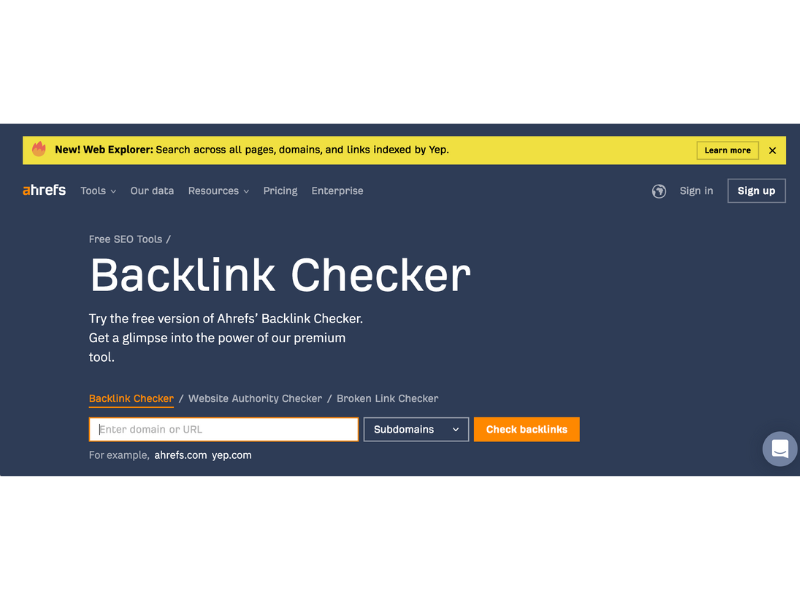
How to build backlinks to your website from high-quality websites
- Create high-quality content that people want to link to. Producing high-quality content people want to link to is the best way to establish backlinks naturally. People who find your content valuable will likely link to it.
- Guest blog on other relevant websites. Guest blogging on other relevant websites is another excellent way to build backlinks. When you guest blog, you can include a link to your website in your author bio.
- Run social media campaigns. When you share your content on social media, be sure to include links back to your website. This strategy can help you attract new visitors and build backlinks.
- Participate in online forums and communities. Share your knowledge and expertise when you participate in online forums and communities. You can also include links back to your website in your posts.
- Use link-building tools. Several link-building tools can help you identify and reach out to potential link partners.
How to track your backlinks and identify broken links
Check your Google Search Console account. Google Search Console is a free tool that allows you to track your website’s performance in Google search results. You can use Google Search Console to see a list of all the backlinks that point to your website and any broken link.
Optimize Your Website for Technical SEO
Optimizing your website for technical SEO is another critical way to prevent keyword ranking fluctuations.
How to make sure your website is fast, secure, and mobile-friendly
-
- Use a speed testing tool to measure your website’s loading speed. There are several free and paid speed testing tools available.
- Reduce the size of your images and videos. Images and videos are often the most significant contributors to slow loading times.
- Use a content delivery network (CDN). A CDN can help deliver your website’s content from servers closer to your visitors, improving loading times.
- Encrypt your website with HTTPS. HTTPS is the secure version of HTTP, becoming increasingly important for search engine rankings.
- Make sure your website is mobile-friendly. More and more people are using their mobile devices to search the web, so ensuring your website is optimized for mobile devices is essential.
How to fix technical issues with your website
-
- Check for broken links. Broken links can hurt your SEO, so it’s essential to check for them regularly.
- Fix any errors in your code. Errors in your code can also hurt your SEO, so fixing them as soon as possible is essential.
- Optimize your website for search engines. You can do several things to optimize your website for search engines, such as using relevant keywords and titles.
- Get your website indexed by Google. Once you’ve optimized your website for search engines, you need to get it indexed by Google. You can do this by submitting your website to Google Search Console.
Conclusion: Mastering SEO Fluctuations | Decoding and Navigating Keyword Ranking Changes and Algorithm Updates
In this comprehensive exploration of keyword ranking fluctuations, we’ve delved into the intricacies of SEO, rankings, and the myriad factors that influence them. We’ve uncovered why your keyword rankings may fluctuate, from algorithm updates to changes in SEO strategy, and provided real-world examples to illustrate these shifts. As you’ve learned, fluctuations are not uncommon; they are, in fact, an inherent part of the digital landscape.
However, there’s no need to let ranking drops send you into a panic. Instead, consider them as opportunities for growth and improvement. With the proper knowledge and strategy, you can regain lost ground and propel your website to new heights. Whether optimizing your content, adapting to algorithm changes, or seeking expert guidance, you can take steps to mitigate the impact of fluctuations.
Remember, SEO is not a one-time effort but an ongoing journey. Embracing and leveraging these changes to your advantage is critical to maintaining and improving your keyword rankings. If you’re looking for assistance in navigating the complex world of SEO and want to ensure that your website ranks higher and achieves excellent results, don’t hesitate to contact us at Your SEO Pro’s The Branding Agency. Our team of experts is ready to help you build effective campaigns, analyze ranking fluctuations, and develop strategies tailored to your specific needs. Let’s work together to ensure your website thrives in the ever-evolving digital landscape.



